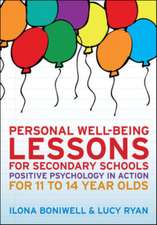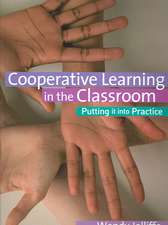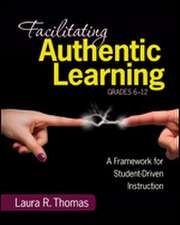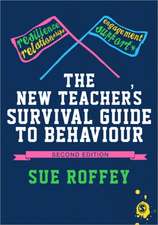Fierce Teaching: Purpose, Passion, and What Matters Most
Editat de Eric P. Jensenen Limba Engleză Paperback – 3 sep 2008
- Easy to learn and implementAdaptable for differentiated instruction and individual learning styles
- Applicable to all grade levels
- Teacher-tested and proven to deliver results in any school setting
- Aligned with current brain and cognitive science research
| Toate formatele și edițiile | Preț | Express |
|---|---|---|
| Paperback (1) | 209.46 lei 6-8 săpt. | |
| SAGE Publications – 3 sep 2008 | 209.46 lei 6-8 săpt. | |
| Hardback (1) | 487.10 lei 6-8 săpt. | |
| SAGE Publications – 3 sep 2008 | 487.10 lei 6-8 săpt. |
Preț: 209.46 lei
Nou
Puncte Express: 314
Preț estimativ în valută:
40.08€ • 41.97$ • 33.24£
40.08€ • 41.97$ • 33.24£
Carte tipărită la comandă
Livrare economică 09-23 aprilie
Preluare comenzi: 021 569.72.76
Specificații
ISBN-13: 9781412963305
ISBN-10: 1412963303
Pagini: 120
Dimensiuni: 178 x 254 x 10 mm
Greutate: 0.25 kg
Ediția:1
Editura: SAGE Publications
Colecția Corwin
Locul publicării:Thousand Oaks, United States
ISBN-10: 1412963303
Pagini: 120
Dimensiuni: 178 x 254 x 10 mm
Greutate: 0.25 kg
Ediția:1
Editura: SAGE Publications
Colecția Corwin
Locul publicării:Thousand Oaks, United States
Recenzii
“The content is crucial for classroom teachers who want to help children learn to their maximum potential.”
“Teachers will benefit greatly from Jensen's knowledge and understanding of many complex topics.”
“This book deals with a stimulating topic for educators and is simple to understand.”
“Teachers will benefit greatly from Jensen's knowledge and understanding of many complex topics.”
“This book deals with a stimulating topic for educators and is simple to understand.”
Cuprins
Preface
About the Author
Introduction
Strategy Number 1. Body and Emotional Connections Made
Body-Mind Emotional Engagement
Five Key Emotional States
Safety
Vesting
Connection
Alertness
Hope
Strategy Number 2. Feedback and Error Correction
The Importance of Feedback
A Case for Feedback Styles
Using Feedback Types
What Makes Feedback Work So Well?
Feedback Should Be Reliable
Strategy Number 3. Input-to-Output Ratio
Who's Doing the Learning?
The Truth About Time in Learning
Mastery of Material Through Time
The Brain's Perspective on Learning
Working Memory
Consolidating the Learning
Hippocampus Overload
Cortical Limitations
How Does the Need for Time Translate Into the School Day?
The Importance of Rest Time
Strategy Number 4. Elaboration for Depth
What Is Elaboration?
Preparation for Elaborative Learning
Elaboration Categories
The "How-to" of Elaboration
Five Elaboration Strategies
Elaboration Alternatives
Strategy Number 5. Recall and Memory Management
What Makes Purposeful Memory Encoding So Good?
Seven Approaches for Repetition to Get Memories Encoded
Pre-exposure
Priming
Prior Knowledge Activation
Post-viewing
Guided Practice
Revision With Links
Strategy Number 6. Content Coherence
What Is Coherence?
Texts With Coherence
Teaching for Coherence
Increasing Key Structural Knowledge
Experiential Learning
Semantic Support
The Use of Models
S-U-P-E-D Up Learning
Sleeping on It
Strategy Number 7. Environmental Management
The Four Environmental Domains
Physical Environments
How Do Environments Affect Us?
Indoor Air Quality
Acoustic Quality
Classroon Lighting
Classroom Temperature
The Social Environment
Social Influences on Our Brains, Bodies, and Lives
Positive Social Structures Work Miracles
Independent Learners
Classroom Dialogues to Build Social Structures
Social Status Strategies in Motion
Academic Climate Management
The Five Success Factors
Celebrate and Affirm the Learning
Life-Path Guidance
The Use of Traditions
Instructional Variety
Student Asset Building
Managing the Cultural Environment
The Culture of "Success" Is All About Achievement
The Counterculture of Success Is That of Disengagement From the System
The School Culture of Character Values Such as Responsibility, Honesty, and Fairness
The Counterculture to Character Is Rebellion
The Culture of Being Respected and Being Somebody
The Counterculture Exists Where Students Disrespect Others
Building Positive Cultures
Epilogue
Bibliography
Index
About the Author
Introduction
Strategy Number 1. Body and Emotional Connections Made
Body-Mind Emotional Engagement
Five Key Emotional States
Safety
Vesting
Connection
Alertness
Hope
Strategy Number 2. Feedback and Error Correction
The Importance of Feedback
A Case for Feedback Styles
Using Feedback Types
What Makes Feedback Work So Well?
Feedback Should Be Reliable
Strategy Number 3. Input-to-Output Ratio
Who's Doing the Learning?
The Truth About Time in Learning
Mastery of Material Through Time
The Brain's Perspective on Learning
Working Memory
Consolidating the Learning
Hippocampus Overload
Cortical Limitations
How Does the Need for Time Translate Into the School Day?
The Importance of Rest Time
Strategy Number 4. Elaboration for Depth
What Is Elaboration?
Preparation for Elaborative Learning
Elaboration Categories
The "How-to" of Elaboration
Five Elaboration Strategies
Elaboration Alternatives
Strategy Number 5. Recall and Memory Management
What Makes Purposeful Memory Encoding So Good?
Seven Approaches for Repetition to Get Memories Encoded
Pre-exposure
Priming
Prior Knowledge Activation
Post-viewing
Guided Practice
Revision With Links
Strategy Number 6. Content Coherence
What Is Coherence?
Texts With Coherence
Teaching for Coherence
Increasing Key Structural Knowledge
Experiential Learning
Semantic Support
The Use of Models
S-U-P-E-D Up Learning
Sleeping on It
Strategy Number 7. Environmental Management
The Four Environmental Domains
Physical Environments
How Do Environments Affect Us?
Indoor Air Quality
Acoustic Quality
Classroon Lighting
Classroom Temperature
The Social Environment
Social Influences on Our Brains, Bodies, and Lives
Positive Social Structures Work Miracles
Independent Learners
Classroom Dialogues to Build Social Structures
Social Status Strategies in Motion
Academic Climate Management
The Five Success Factors
Celebrate and Affirm the Learning
Life-Path Guidance
The Use of Traditions
Instructional Variety
Student Asset Building
Managing the Cultural Environment
The Culture of "Success" Is All About Achievement
The Counterculture of Success Is That of Disengagement From the System
The School Culture of Character Values Such as Responsibility, Honesty, and Fairness
The Counterculture to Character Is Rebellion
The Culture of Being Respected and Being Somebody
The Counterculture Exists Where Students Disrespect Others
Building Positive Cultures
Epilogue
Bibliography
Index
Descriere
Achieve consistent, positive teaching results using these brain-compatible methods that are readily adaptable to individual learning styles, aligned with current research, and applicable to all grade levels.












